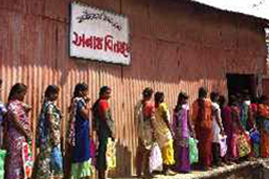
Forty-five years ago, this region faced abject poverty, food and water shortages, and even famine in 1973. It became necessary to deliver grain to as many people as possible during this time of famine. Initially this was accomplished with subsidized prices, then free distribution and eventually in the form of loans. This practice, locally called, “khavti”, is one in which the people borrow grain at the beginning of monsoon season to provide for their daily needs, repaying 1.5 to 2 times the amount from their own harvest post Diwali. More often than not, this practice becomes a means to exploit the people.
The Sarvodaya Parivar Trust was established to free the people from this exploitation. With the Trust, the people repaid the same amount of grain that the had initially borrowed. There was no contractual paperwork or interest, merely an agreement made in good faith with God as a witness. Over five thousand families were given khavti and over 90% of them returned the loan dutifully.
The practice of giving Khavti continued for 16 years. Together with this, the practice of providing grains at subsidized prices round the year was also introduced… which continues till this day. Each family was given a card for allocation of grain on subsidized prices.Each card got a family 20 kilos of grain in once a a month at subsidized prices. From 1973 to 1991, for 19 consecutive years, grain was given at a nominal price of Re.1 per kilo. In 1992 when the cost of buying grain crossed Rs. 4 a kilo; the subsidized price of grain was revised to Rs.2 per kilo. By 2008, the subsidized price was revised to Rs. 5 a kilo. Today, grain is not available for less than Rs.17 a kilo, and as of September 2012, at Pindval it is provided by the Trust at a subsidized price of Rs. 10a kilo.
Particulars from start of Grain at subsidized prices scheme till date (2013-14)
The situation has changed greatly from what it was 45 years ago. Since the year 2000, water preservations by constructing check dams, forest and land conservation have resulted in an increase in agricultural productivity. This has led to a higher degree of self-reliance inthe villages.
© 2024 Sarvodaya Parivar Trust. All rights reserved.
